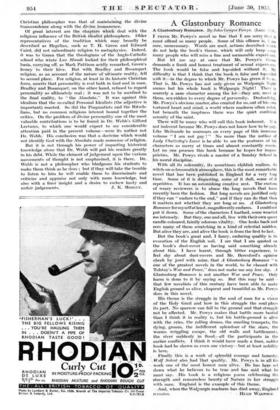A Glastonbury Romance
A Glastonbury Romance. By John Cowper Powys. (Lane. 1.1/6_, I THINK Mr. Powys's novel so fine that I am sorry that it must offend so many people. Some of this offence is, I an, sure, unnecessary. Words are used, actions described which do not help the book's theme, which will only keep away Many people who will miss a fine and memorable experience.
But let me say at once that Mr. Powys's theme demands a frank and honest treatment of sexual experience, The book would be false and lop-sided without it. My difficulty is that I think that the book is false and lop-sided with it—in the degree to which Mr. Powys his given it t4) us. That is, Mr. Powys has not only given US Walptirgis Night scenes but his whole book is Walpurgis, -Night! .There is scarcely a sane character among the lot—they are, most of them, sex-ridden to every degree of perversity. Dostoeffsky, Mr. Powys's obvious master, also created for us, out of his own tortured heart and mind, a world where madness 'often ruled, but beneath the inaptness there was the quiet confident serenity of the saint.
There will be many who will call this book indecent. It is not indecent because Mr. Powys does not know how to be gay. Like Melisande he murmurs on every page of this immense volume "I am not gay ! " No more than the author of . Lady Chatterley's Laver is he able to see the postures of his characters as merry at times and almost constantly comic.
Let ho one procure this book because he hopes for impro- .. . _ prieties. Mr. Powys rivals a master of a Sunday School in
• his moral discipline. . With all its solemnity, its sometimes childish realism, its vritcli-on-a-hroOmstick atmosphere, this is the most remarkable novel that hii been published in England for a very long tithe. Some of it is disgusting, some of it dull, some of it repetitive. It has an astonishing creative zest. The custom of weary reviewers is to abuse the long novels that have recently been the fashion. But long novels are justified only if they can "endure to the end," and if they can do that then it matters not whether they are long or no. A Glastonbury Romance for myself at least, magnificently endures. I could not
• .put it down. Some of the characters I loathed, some wearied me intensely. But they, one and all, live with their own queer candle-coloured, faintly odorous vitality. One looks back and sees many. of them scratching in a kind of celestial midden. But alive they are, and alive the book is from the first to last.
But the book's great and, I fancy, enduring quality is its evocation of the English soil. I see that I am quoted on the book's dust-cover as having said something already about this. I have learnt, through bitter experience, to feel shy about dust-covers and Mr. Beresford's opinion cheek by jowl with mine, that A Glastonbury Romance "is one of the greatest novels in the world, to be classed with Tolstok's War and Peace," does not make me any less shy. A Glastonbury Romance is not another War and Peace. Only harm is _done to it by saying so. But this may be said— that few novelists of this century have been able to make English ground so alive; eloquent and beautiful as Dir. Powys
does in this novel. . _
His theme is the struggle in the soul of man for a vision of the Holy Grail and how in this struggle the soul plays its part. No sparrow can fall to the ground and that struggle not be affected. Mr. Powys makes that battle more bestial than I think it in reality is, but his battle-ground is alive with the cries, the rolling drums, the snarling trumpets, the dying, groans, the indifferent splendour of the Stars, the worms wriggling escape, the old walls and battlements, the river suddenly in flood:-Tall the participants in the earlier cOnfliCti. I think it would have made a finer, nobler -book had he shown us even one victory—but at least nobility is here. .
Finally his is a work of splendid courage and honesty. Wolf Solent also had that quality. Mr. _Powys is in all his - work one of the most-honest men alive. He has here set down what he believes to be true and has Said whist he ' must say. His book is a religious poem celebrating the -strength and remorseless beauty of Nature in her struggle with man. England is the example of this theme.
:And, when the Walpurgis madness has died away,-England










































 Previous page
Previous page